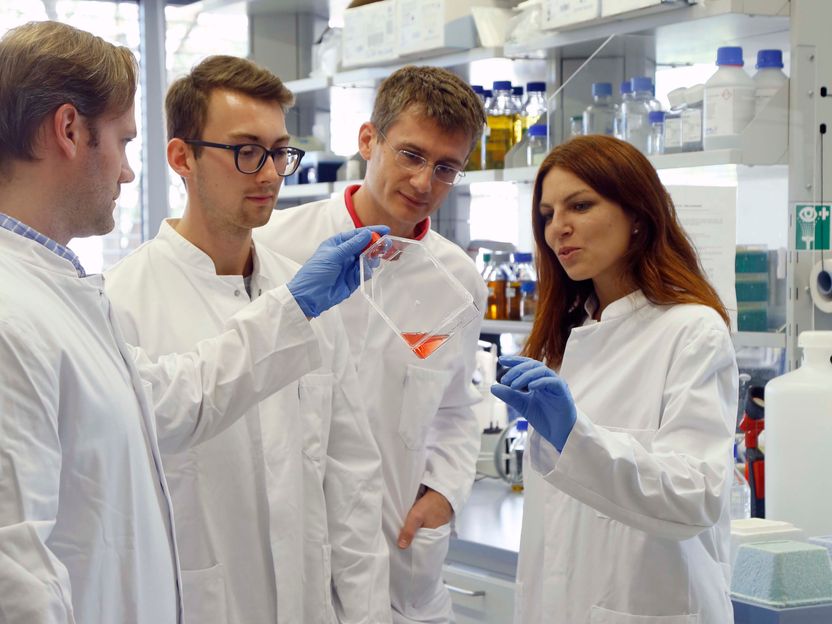CRISPR/Cas libraries open new avenues in cancer research
Innovative methods lead to foundation of start-up Vivlion GmbH
Advertisement
CRISPR/Cas enables the targeted deactivation of genes by cutting DNA at pre-determined sites. This is accomplished by providing the Cas enzyme with a genetic zip code. Using an entire library of zip codes, it is then possible to simultaneously probe multiple sites within the genome, for example to determine which genes are essential for cancer cell survival. This could revolutionize drug discovery.

The team of Manuel Kaulich (2nd from left) in the laboratory.
Uwe Dettmar
Unfortunately, however, creation of libraries containing high numbers of zip codes covering the entire genome proved to be difficult. Researchers at Goethe University now succeeded in solving this problem. As Dr Manual Kaulich reports in the scientific journal “eLife”, he and colleagues found a reliable method for creating libraries of any magnitude. “Using our newly developed 3Cs technology, we for the first time came up with a library that allows us to investigate the entire genome simultaneously – including non-coding regions outside of genes. In total, our library contains 16.5 million unique zip codes,” explains Kaulich, who leads an independent research group at the Institute of Biochemistry II.
The non-coding regions which represent 98% of our genome are of particular interest as they are suspected to hold the key to numerous regulatory mechanisms. CRISPR/Cas reagents produced by the novel method can for example help to better understand mechanisms underlying chemotherapy resistance.
The flash of inspiration hit Manuel Kaulich together with colleague Dr Andreas Ernst, who at that time was also heading a research group at Institute of Biochemistry II. “We were chatting about our different areas of expertise and suddenly there was this compelling idea on how to elegantly combine the two,” state Kaulich and Ernst.
Since then, Manuel Kaulich has established numerous additional collaborations, like the one with Dr Anja Bremm, also a group leader at the Institute of Biochemistry II, on the biological relevance of a certain protein class. Together with Institute Director Professor Ivan Dikic, he set up the “Frankfurt CRISPR/Cas Screening Center” (FCSC), which aims at making the technology broadly accessible for studying unknown cellular functions. Ivan Dikic comments: “This exciting discovery is also attributed to the unique culture of our Institute, which inspires creativity, new ideas, and teamwork.”
Through its technology transfer subsidiary Innovectis, Goethe University has meanwhile applied for a patent to protect the innovative idea. The patent also forms the basis for the start-up company Vivlion GmbH, which was recently founded by three employees of the Institute of Biochemistry II together with Goethe University. Vice President Professor Manfred Schubert-Zsilavecz comments: “This is a milestone for the Goethe University: Vivlion is the first start-up that was founded with the participation of Goethe University employees.”
Innovectis prepared the grounds for the start-up to take off. As Innovectis CEO Martin Raditsch states, “I am very happy about successfully starting Vivlion GmbH from out of Goethe University, because we have here a very promising technology coming together with an excellent working group and a perfectly assembled founding team.” The company will introduce the first 3Cs reagents to the market in the upcoming months.
Original publication
Other news from the department science
Most read news
More news from our other portals
Something is happening in the life science industry ...
This is what true pioneering spirit looks like: Plenty of innovative start-ups are bringing fresh ideas, lifeblood and entrepreneurial spirit to change tomorrow's world for the better. Immerse yourself in the world of these young companies and take the opportunity to get in touch with the founders.






















































